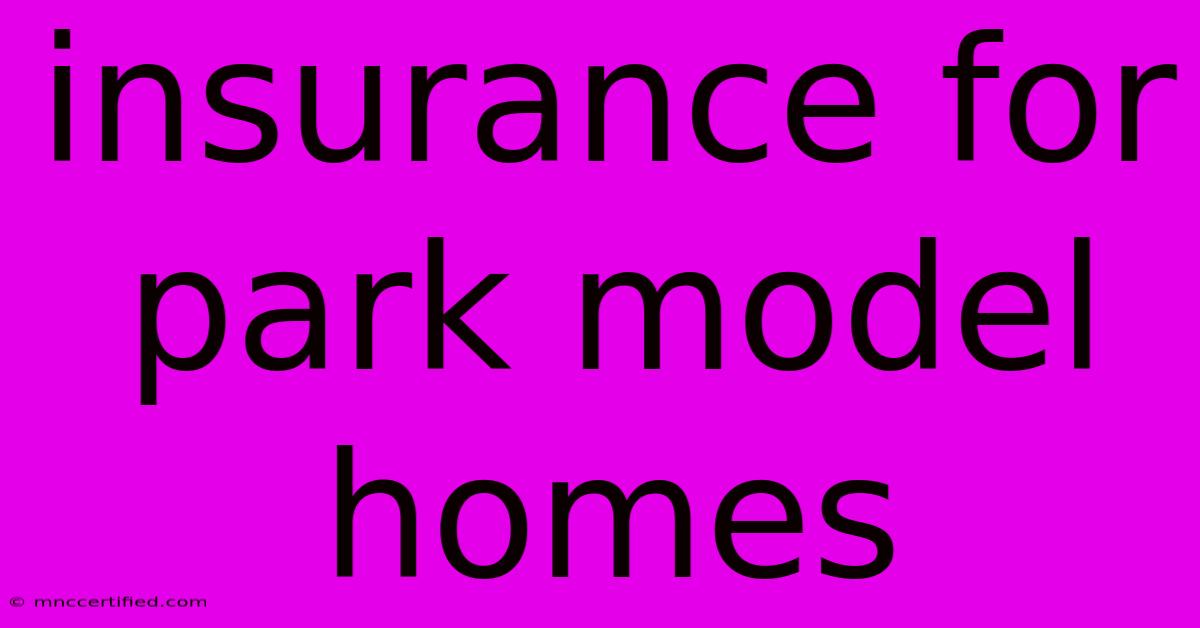Insurance For Park Model Homes

Table of Contents
Insurance for Park Model Homes: A Comprehensive Guide
Finding the right insurance for your park model home can feel like navigating a maze. These charming, smaller homes offer a unique blend of portability and permanent living, presenting specific insurance needs often overlooked by standard homeowner's policies. This comprehensive guide will unravel the complexities, helping you secure the best coverage for your investment.
Understanding Park Model Homes and Their Insurance Needs
Park model homes, often categorized as recreational vehicles (RVs) or manufactured homes, blur the lines between traditional houses and mobile dwellings. This hybrid nature influences their insurance requirements. Unlike traditional homes, they might not fall neatly under standard homeowner's insurance policies. Their portability also presents challenges not faced by stick-built houses.
Key Differences from Traditional Homeowners Insurance:
- Mobility: The ability to move your park model home affects coverage. Some insurers require specific site permits or restrictions on relocation frequency.
- Construction: Park models typically have lighter construction than traditional homes, potentially impacting coverage for certain types of damage.
- Location: Insurance costs can vary significantly based on the location of the park, considering factors like weather patterns and crime rates.
- Personal Property: Coverage for personal belongings inside your park model requires careful consideration and may necessitate separate policies or riders.
Types of Insurance for Park Model Homes
Several insurance options cater to the specific needs of park model owners. Understanding these options is crucial for securing adequate protection.
1. Manufactured Housing Insurance:
Many insurers specialize in manufactured homes, which often share similarities with park models in terms of construction and materials. This type of policy often offers comprehensive coverage, including damage from wind, fire, and other perils. Crucially, be sure to specify that your home is a park model when applying. Some policies may explicitly exclude park models, so clear communication is key.
2. RV Insurance:
If your park model is registered as an RV, RV insurance might be an option. However, coverage can be limited if the home is permanently sited and not frequently moved. It might primarily cover liability and personal property rather than the structure itself. Always check the policy details carefully to ensure the level of structural coverage aligns with your needs.
3. Homeowners Insurance with Endorsements/Riders:
Some homeowners insurance providers might offer coverage for park models with specific endorsements or riders added to a standard policy. These additions tailor the policy to include features relevant to park model homes. Contact multiple insurers to see if this option is available in your area.
Essential Coverage Considerations
Regardless of the chosen policy, these key coverage areas are paramount:
- Dwelling Coverage: This protects the structure of your park model against damage from various perils, such as fire, wind, hail, and vandalism.
- Personal Property Coverage: This covers your belongings inside the home against loss or damage. Ensure adequate coverage for high-value items.
- Liability Coverage: This protects you financially if someone is injured on your property.
- Additional Living Expenses: This covers temporary accommodation costs if your home is uninhabitable due to damage.
Finding the Right Insurer: Tips and Strategies
- Compare Quotes: Obtain quotes from multiple insurers specializing in manufactured homes or RVs to compare pricing and coverage.
- Read the Fine Print: Carefully review policy documents to understand exclusions and limitations.
- Check for Discounts: Inquire about discounts for safety features, security systems, or claims-free history.
- Consider Your Needs: Assess your risk tolerance and the value of your park model to determine the appropriate coverage level.
- Ask Questions: Don't hesitate to contact insurers directly to clarify any ambiguities.
Off-Page SEO Considerations:
To enhance the search engine optimization of this article beyond on-page factors (keywords, headers, etc.), consider these off-page strategies:
- Backlinks: Reach out to relevant websites and blogs focused on RV living, manufactured homes, or retirement communities and request backlinks to this article.
- Social Media Promotion: Share the article on social media platforms frequented by your target audience.
- Directory Submissions: Submit this article or a summarized version to relevant online directories focused on insurance or park model living.
By carefully considering these factors and actively comparing insurance options, you can secure the best possible protection for your park model home, ensuring peace of mind for years to come. Remember, proactive research and clear communication with insurance providers are crucial for finding the ideal policy.

Thank you for visiting our website wich cover about Insurance For Park Model Homes. We hope the information provided has been useful to you. Feel free to contact us if you have any questions or need further assistance. See you next time and dont miss to bookmark.
Featured Posts
-
Kinsale Insurance Company Naic
Nov 27, 2024
-
Easter Road Thriller Hibs Draw
Nov 27, 2024
-
Insurance Agency Bowling Green
Nov 27, 2024
-
Finders Insurance Inc Pasco Wa
Nov 27, 2024
-
Arrnf Stock Record High Rare Earth Grades
Nov 27, 2024